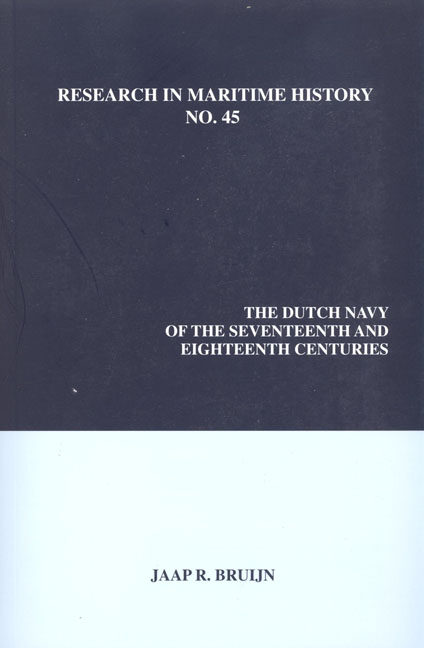Book contents
- Frontmatter
- Contents
- Illustrations
- Tables
- Series Editor's Foreword
- About the Author
- Introduction to the 2011 Edition
- Foreword
- Preface
- Introduction
- Map of the Dutch Republic
- Map of Dutch Naval Activity in European Waters
- Part One The “Old” Navy, Late 1500s-1652
- Part Two The “New” Navy, 1652-1713
- The “Old” Navy Out of Date
- John de Witt's New Navy
- An Era of Naval Campaigns against England and France and in the Baltic
- Changes in the Naval Administration
- De Ruyter and the Other Naval Officers
- Well-manned Ships
- Part Three A Second-Rate Navy, 1714-1795
- In Retrospect
- Bibliography
- Index
John de Witt's New Navy
from Part Two - The “New” Navy, 1652-1713
- Frontmatter
- Contents
- Illustrations
- Tables
- Series Editor's Foreword
- About the Author
- Introduction to the 2011 Edition
- Foreword
- Preface
- Introduction
- Map of the Dutch Republic
- Map of Dutch Naval Activity in European Waters
- Part One The “Old” Navy, Late 1500s-1652
- Part Two The “New” Navy, 1652-1713
- The “Old” Navy Out of Date
- John de Witt's New Navy
- An Era of Naval Campaigns against England and France and in the Baltic
- Changes in the Naval Administration
- De Ruyter and the Other Naval Officers
- Well-manned Ships
- Part Three A Second-Rate Navy, 1714-1795
- In Retrospect
- Bibliography
- Index
Summary
It is unlikely that anyone in 1654 anticipated that the next two decades would become the most glorious and spectacular period in the history of the Dutch navy, an era full of battles, nearly all graphically portrayed in the many paintings and drawings of father and son Van der Velde. Any prediction along these lines would have appeared ridiculous in view of the 1652-1654 defeats against the English navy, the ignominious behaviour of some captains, or the loss of eleven menof- war off Texel during one stormy November night in 1653. Nevertheless, the important changes in Dutch naval politics noted above had already been set in motion. In addition, the city and admiralty of Amsterdam were increasing their influence on naval affairs, outstripping the financially weak admiralty of the Maze, pushing the economic priorities of Zeeland in Brazil and the West Indies into the background, and giving pride of place to their own commercial interests in the Baltic, the Iberian Peninsula and the Mediterranean. At Amsterdam's suggestion, the admiralties’ ordinary income had already been increased by one third.
It was primarily the efforts of Grand Pensionary John de Witt (1625- 1672), however, which prepared the Dutch navy for the most splendid and illustrious episode in its history. At the age of twenty-eight, in the midst of the naval disasters during the summer of 1653, De Witt became the most important and influential civil servant in the Dutch Republic. He was born at Dordrecht, the oldest city in the province of Holland, and was the son of one of the leading provincial regents. Appointed city pensionary in 1651, he represented Dordrecht in the States of Holland and was a member of Holland's delegation in the States General. Soon involved in naval affairs, he made suggestions for the better control of the admiralties. Out of ten candidates, he was unanimously chosen as grand pensionary on 23 July 1653. The office of grand pensionary of Holland was in principle almost purely administrative and did not entitle the holder to any special authority with the navy. An appointment was for five years and could be prolonged, making the grand pensionary a rather permanent figure in a political scene composed of continuously changing groups of representatives of the different cities and provinces.
Since the days of Van Oldenbarnevelt (1586-1619), most grand pensionaries were the unofficial makers of Dutch foreign policy.
- Type
- Chapter
- Information
- Publisher: Liverpool University PressPrint publication year: 2011

